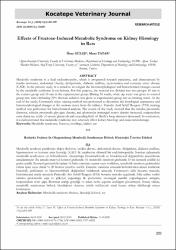Effects of fructose-induced metabolic syndrome on kidney histology in rats
Citation
Güleş, Ö. & Tatar, M. (2020). Effects of Fructose-Induced Metabolic Syndrome on Kidney Histology in Rats . Kocatepe Veterinary Journal , 13 (2) , 203-209 . DOI: 10.30607/kvj.715053Abstract
Metabolic syndrome is a fatal endocrinopathy, which is progressed towards pandemic, and characterized by
insulin resistance, abdominal obesity, dyslipidemia, diabetes mellitus, hypertension and coronary artery disease
(CAD). In the present study, it is aimed to investigate the histomorphological and histochemical changes caused
by the metabolic syndrome in rat kidneys. For this purpose, the material was divided into two groups: 10 rats in
the control group and 15 rats in the experimental group. During 16 weeks, while tap water was given to control
group rats, water including 20% fructose solution was given to experimental group rats as drinking water. At the
end of the study, Crossman's triple staining method was performed to determine the histological appearance and
histomorphological changes in the sections taken from the kidneys. Periodic Acid Schiff Reagent (PAS) staining
method was performed for histochemical analysis. The results of the study showed that the tubulus proximalis
diameter, tubulus proximalis glycogen density, and glomerular mesangial matrix density increased, corpusculum
renis diameter, width of cavum glomeruli and ascending limb of Henle’s loop diameter decreased. In conclusion,
it is demonstrated that metabolic syndrome may adversely affect kidney histology and cause renal damage. Metabolik sendrom pandemiye doğru ilerleyen, insülin direnci, abdominal obezite, dislipidemi, diabetes mellitus,
hipertansiyon ve koroner arter hastalığı (KAH) ile karakterize ölümcül bir endokrinopatidir. Sunulan çalışamada
metabolik sendromun rat böbreklerinde oluşturduğu histomorfolojik ve histokimyasal değişimlerin araştırılması
amaçlanmıştır. Bu amaçla materyal kontrol grubunda 10, metabolik sendrom grubunda 15 rat içerecek şekilde iki
gruba ayrıldı. Kontrol grubundaki ratlara 16 hafta süresince çeşme suyu verilirken, metabolik sendrom grubundaki
ratlara içme suyu olarak % 20 fruktoz çözeltisi verildi. Deneme sürecinin sonunda böbreklerden alınan kesitlerde
histolojik görünümü ve histomorfolojik değişimleri belirlemek amacıyla Crossman’s üçlü boyama metodu,
histokimyasal analiz amacıyla Periyodik Asit Schiff Reagent (PAS) boyama metodu uygulandı. Elde edilen veriler
tubulus proksimalis çapı ve glikojen yoğunluğu ile glomerular mezangial matriks yoğunluğunun arttığını,
korpuskulum renis çapı, Bowman aralığı genişliği ve çıkan henle çapının azaldığını göstermiştir. Sonuç olarak,
metabolik sendromun böbrek histolojisini olumsuz yönde etkileyerek renal hasara sebep olabileceği ortaya
konmuştur.
Source
Kocatepe Veteriner DergisiVolume
13Issue
2URI
https://dergipark.org.tr/tr/pub/kvj/issue/52778/715053https://doi.org/10.30607/kvj.715053
https://hdl.handle.net/11630/9374
Collections
- Cilt 13 : Sayı 2 [19]



















